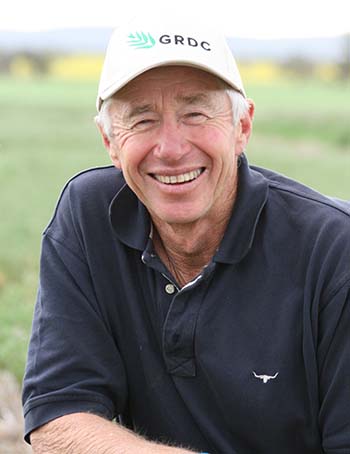When the focus is firmly on harvest after a run of dry seasons, and with financial pressure and COVID-19 restrictions compounding the workload for some growers, it can be easy to overlook on-farm workplace health and safety.

NSW grain grower and GRDC Northern Region Panel member Roy Hamilton is urging his industry colleagues to take extra care with workplace health and safety this harvest. Photo: GRDC.
But the price of not paying attention can be life threatening.
Statistics from the Rural Safety and Health Alliance (RSHA) – of which the Grains Research and Development Corporation (GRDC) is a member – show an average three deaths and 140 injuries a year on grain farms in Australia and a further four deaths and 450 injuries on mixed livestock and grain farms annually.
In the grains sector an estimated 19 per cent of these accidents or injuries happen during harvest, while 25 per cent occur loading or unloading grain.
In addition to the nonquantifiable grief and loss, the estimated cost of loss of life, injury and illness to the grains industry and the mixed livestock/grains industry is an estimated $30 million per year.
Seasoned grain grower Roy Hamilton from the New South Wales Riverina is urging his industry to make safety the number one priority this harvest, after several serious accidents, including two fatalities, across his region in recent weeks.
GRDC Northern Region Panel member said yields and profit margins were important, but they paled in comparison to the value of human life.
“I understand how important this harvest is to so many growers, especially after some challenging seasons,” Mr Hamilton says.
“This time of year is incredibly busy and, when you are so focused on getting your crop off, it can be easy to take a short cut with a job, stay extra hours in the harvester and misjudge your timing with machinery.
“But what is really important is managing the safety and well-being of yourself, your family and your staff through harvest so you can all enjoy the rewards when it’s done.”
It is advice echoed by GRDC Senior Regional Manager – North, Gillian Meppem.
A former grain grower, Ms Meppem says supporting each other was particularly important this year following the prolonged drought, the anxiety of COVID-19, labour shortages in many regions, and the financial pressure many growers were under to maximise harvest returns.
“We all know that 2020 has been a year like no other and it has had varying impacts on us all,” she says.
“To get through stressful times like harvest, we need to keep being there for each other, and keep communicating with our families, friends, staff and neighbours.
“If you are lying awake at night worrying about money or how you are going to get this crop off, or the next crop in, talk to someone – your bank manager, your partner or a trusted friend. Internalising worry just makes you more tired and stressed.”
Looking to the weeks ahead, Mr Hamilton said it was critical growers and their on-farm teams prioritised their well-being with many in southern NSW anticipating a ‘bigger than average’ harvest after good spring rain.
He said windrowing had started on his farm near Rand in the Riverina and the canola would be followed by wheat harvest.
“We all have a lot of work in front of us, harvest days are long and things can and will go wrong,” he says.
“Research shows farms are among the most dangerous workplaces in Australia and during harvest the risks are amplified by extra people, extended work hours and large machinery.
“Not cutting corners, managing fatigue, staying hydrated and well fed and making sure we check in on each other is critical. We need to get to the end of harvest safely so we can celebrate together.”
GRDC together with eight other research and development corporations (RDCs) identified a need to work together on a cross-sectoral research, development and extension strategy in workplace health and safety (WHS) and formed the Rural Health and Safety Alliance (RSHA) in 2018.
The RSHA identifies which WHS risks on farm should be targeted and conducts research to inform evidence-based WHS guidelines on farm. For tips on managing farm safety during harvest go to the National Centre for Farmer Health.
More information: Toni Somes, toni.somes@grdc.com.au, 0436 622 645.

























































